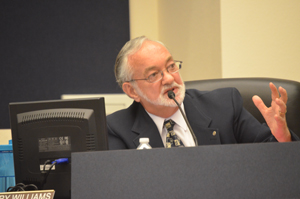
A rebellion among business owners in Bunnell stopped the city cold from implementing a controversial and unusual plan that would have allowed the city to shift the responsibility for utility bills from tenants to landlords.
The city proposed the shift ostensibly to stop losing money from delinquent accounts. But business owners, among them Mark Langello, who owns the Atlantis Industrial Business Park, and Marvin Sheets, who owns Marvin’s Garden, in Bunnell—said the city was turning landlords into its policing arm while sending a terrible message to business in general.
“You’re basically telling the landlords, telling the business people who pay a good percentage of your taxes and don’t collect a lot of the services, hey, don’t come here to Bunnell,” Langello told city commissioners. “You’re shifting that burden back on the residential taxpayer because we don’t want this burden, we don’t want this expense. You also opened up a can of worms with this thing because you said in this ordinance that the solvency of the water department was relying on this. But I contend that’s not the truth at all.” He proposed the city should audit more precisely how much money it projects to be losing in coming years, and said the amount is not likely to be anywhere near the amount written off to cover the past six years.
Originally, Commissioner Tucker moved to approve the ordinance, with Commissioner Bonita Robinson seconding the motion. That would not last. Tucker withdrew his motion just before the vote, saying better evidence is needed before changing billing procedures, and Robinson, after hearing from the business community, made it clear she would not have supported the proposal, as did Commissioner Bill Baxley.
The proposal died. But the issue does not. There are problems in Bunnell’s utility department, which the proposal—presented to the city commission a week ago—crystallized from the city’s perspective and the business community’s perspective.
In September, the city commission approved writing off $200,804 in uncollected water and sewer debts that had accrued over the previous six years. To stop accruing further debt, the city drafted a proposal that would change the way delinquent accounts are handled by shifting the burden of delinquent accounts to landlords rather than tenants. Put another way: if a landlord has 10 businesses, and a single one of those businesses is delinquent on water and sewer bills two or more times in a two-year period, the city then has the authority, based on the utility director’s discretion, to shift all billing for all 10 businesses to the landlord—and slap a lien on the property if the landlord doesn’t pay up. The same principle would apply to landlords’ residential accounts.
The city sought the change because current law doesn’t allow liens on a property when tenants alone haven’t. But a recent court case opened the door to such liens by “designating landlord-only” accounts,
Wade Vose, the Bunnell city attorney, said. “At that point the property owner is on the hook for payment of that bill,” or is subject to delinquency.
The proposal was problematic from the start. The city attorney noted some of thoe problems.
“There’s a downside to this,” Vose warned. “If there is a delinquent account with a tenant and it’s determined that it’s going to be changed over to a property owner-only account, in all likelihood you’re doing that right when somebody has a past-due bill, they’re never going to pay that bill.”
The idea is to shift the risk of recurring delinquencies to landlords, “because right now the water and sewer accounts, the water and sewer fund, is bearing that risk,” Vose said.
A proposal focused on residential customers miscalculates the alienating effect on businesses in the city.
The city did not specify a process that would clearly inform landlords that such a shift would occur, other than a notice informing the landlord that the landlord-only bill would kick in at a certain date.
Another problem, unmentioned during the discussion: The utility director’s discretion would play a big role once the delinquency threshold is tripped: it would be up to the director—not to policy, not to law—to decide which landlords would become landlord-only accounts and which would not, thus potentially opening the way to arbitrariness or favoritism.
Mark Langello contended that under the proposed plan, the lien would be the primary way to collect the money. “It is not,” Langello told commissioners. “It never has been. Most cities don’t do this. For instance Palm Coast next to us doesn’t do this.” Rather, cities collect a security deposit and hold it against the bill. If the bill isn’t paid, the city turns the water off. If the bill is still not paid, the water stays off, and the security deposit is lost. (Bunnell charges a $350 deposit to businesses, $300 to residential accounts for water and sewer.) “This is the primary method, not liening the property,” Langello said. “That doesn’t in fact get your water bill paid necessarily. It means you’re going through a lot of processes to try to collect the money.”
Langello also cast doubt on the rationale behind the ordinance—the $200,000 write-off—and raised serious issues with the city’s means of accounting. When he saw the list of people listed on the city’s alleged delinquency list, he started calling names he knew. “In every single case that I talked to,” he said, “every person told me the same thing: what do you mean I owe the city any money? I’m paid up with the city, I don’t owe them anything.” None of the people he called had any idea they were on the list. Langello said the city’s past bookkeeping was flawed and riddled with discrepancies. And the city several years ago fired one of its employees for taking cash from utility bills without recording them. “The person was not prosecuted legally,” he said. “Now, how many other people in the city could have been stealing from the city that you may not have known about? That could account for a portion of that money.”
Lastly, the city failed to collect on many of its security deposits in the past, Langello said. He did not dispute the fact that residents have carried out “shenanigans” with the city. But that’s not landlords’ fault. “Landlords aren’t the police,” he said. Nor could or should they police their tenants when it comes to utility bills: they would sue the city if put in that situation, Langello warned.
“You’re putting the landlord in a position that he can’t win,” he said. “We didn’t come here to invest our money in the city to collect the bill for you,” he said, referring to business landlords. He disputed the city’s “process” to inform landlords that they would suddenly become responsible for their tenants’ bills, since that process could kick in years from now.
Langello then made even more serious allegations: that the city is overbilling its own utility department for “rent” and the use of city staff. Cities can do that with their so-called “enterprise” accounts, meaning accounts that are not part of the tax structure, and that generate their own money through fees. The utility department is such an account. It runs on fees charged customers, and may not use tax dollars as subsidies. To the contrary: cities sometimes use their utility departments to subsidize their tax-funded operations in creative ways, thus keeping property taxes artificially low.
A city can therefore charge “rent” to its utility department and put those rent payments into its general fund, alongside tax revenue. But that rent is arbitrary: it’s whatever the city says it should be. Langellow
suggested the city may be inappropriately charging the utility department bigger rent fees than it should, thus unnecessarily affecting the utility department’s balance sheet. “So there’s a huge amount of money flowing out of the utility department,” he said.

By then, the city administration was seeing its miscalculations more clearly.
“The primary concern arose out of what tend to be shorter-term residential rent,” Vose, the city attorney, said, though most of the concerns came from business owners. “Those concerns are well-founded in terms of what they’re looking at and they don’t go to the primary concern that staff had had in trying to formulate some of this.”
Commissioner Bill Baxley said he’d “not be in favor of this in any way, shape or form,” whichever way the proposal was intended. The city should correct its own billing practices by, for starters, billing more swiftly, rather than giving a two-month grace period before the bill is paid.
“We need to go back and deal with the root of the problem,” Mayor Catherine Robinson said, agreeing with Baxley.
“Our problem is not commercial,” Larry Williams, the city manager, said. His administration has considered changing the billing process, but the city was worried about hitting customers with sudden double bills. Robinson, the mayor, said the matter should still be “transitioned.”
“I’m so happy that they showed up tonight because it pointed out everything that we didn’t see,” Williams said.





























Karnack says
Desperate acts targeting the owners of residential and commercial properties to pay for past fraud and incompetence of the city commissioner’s and administrative staff, exposes their fear that the public will demand accountability for their wasted tax dollars.
” Desperate times call for Desperate measures “
Anonymous says
Two words. Security Deposit
Another two words: Credit Score
It’s how business works.
Perhaps Palm Coast needs to run their utilities like a business instead of like the Fed.
Dean Carpenter says
This is not newsworthy. What is newsworthy is that Bunnell does not use security deposits and assess individual credit risks as do modern businesses and banks to ensure a profitable enterprise. Waiting on the upcoming story about necessary tax increases.